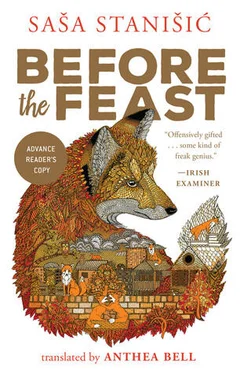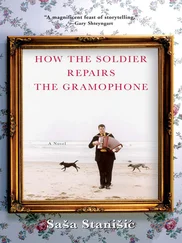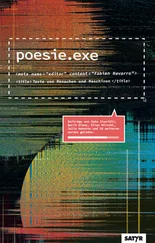Silent Suzi watched the chaos from his favorite place for angling, which also had a view of Fräulein von Blankenburg’s favorite place for bathing. Before the mice gave battle, Suzi had whistled a little tune, and after it had died away they went back into the chinks and cracks provided by Nature.
The mice didn’t spare Magdalene either. Fräulein von Blankenburg (aged seventeen) likes poetry more than agriculture. Hardly ever uses her posh “von” particle. Likes to go barefoot: Magdalene. Moves with a sleepwalker’s certainty: Magdalene. Likes Hugo von Hofmannsthal, the Russians and their language: Magdalene. Highly strung. Well brought up. She’d rather have spent her summer holidays on the Mediterranean, all the same.
Magdalene did not take part in the festivities. Once the hunting party had broken up she went swimming, carefully, so as not to disturb the bittern. And then the mice struck, stealing her tiara, an heirloom left to her by her great-grandmother Magdalene. A tiara set with jewels, full of sparkling memories.
“CRAZY SHIT!” CRIES THE JOURNALIST, WHEN FRAU Kranz opens the attic, another torrent of canvases flows out, and Frau Kranz would probably like to lock him in up there so that she can have some peace at last, but she doesn’t do that out of consideration for her work stored up here and her cat who goes hunting in the attic.
“Is that Jesus?” The journalist has gone up to a large portrait.
“No, that’s Manu from the ice cream parlor.”
A Kranz hangs in Manu’s ice cream parlor (a still life entitled Ice Cream Sundae ). A Kranz hangs in Krone’s butcher shop. A Kranz in the Prenzlau school dining room smells of Healthier-School-Dinners-in-Today’s-New-Federal-German-States.
The picture of Ulli’s garage hung in Ulli’s garage for some time, but without the calendar showing erotic pictures of Polish girls, which Frau Kranz had replaced by a sunflower, but then Ulli pasted a tiny cut-out naked Polish girl over it again.
This season there has been a Kranz hanging in the clubhouse changing room of Fürstenfelde FC. First XI, as a talisman. The footballers touch the sports field in the picture for luck, before running out on the real sports field. The team did lose the first two matches 0–5 and 1–4, but none of the players were injured.
The journalist looks at an unusual sequence of pictures: the colors are stronger, the heads and bodies more angular. Threshing Machine with Transmission Drive in the Fields is the title of one of the paintings. On another, one showing children and Colorado beetles, there is even a text: Everyone Must Help Fight Off the Yankee Beetles! The journalist asks about the background to it. Frau Kranz tells him not to be so dim.
“Did you ever paint the Banat district?”
“I was too young.”
“But you must surely have some memories of it.”
“Memories aren’t always a lot of use when you’re painting.”
Countless, countless pictures, but none of Fürstenfelde by night. There had been attempts. Failing perhaps because of the demands they made on Frau Kranz, or her poor night vision. Failing perhaps because of the night. This time she has promised to paint a night picture for the auction sale. But also for herself.
“Do you have a favorite picture?”
“Oh, well, I’ve painted so many. Do you see this one? Do you know where it is? It’s the dance floor in Blissau’s restaurant. End of the 1960s, that was. My goodness, no, I suppose you don’t know it, you wouldn’t have been born yet. How old are you, twenty?”
“Forty-four.”
“And still on a local paper, are you?”
“Depends what you mean by local — the Uckermark. . I mean, I. .”
“But I think that’s good! You know your way around here, don’t you? I think it’s good to know your way around. All I wanted was to know my way around. German castles, the Rhine, the Pyramids. It’s all right, in fact it’s good there are things like that. For whoever lives there, for whoever wants to travel and can. I went on a long journey. Or rather I had to. I’m happy with that. The Banat area, yes. Birth is our first lottery ticket in life. Mine was a dead loss, but there’s no need to make a great fuss about it.”
Frau Kranz only talks about things that she wants to talk about; she doesn’t have time for anything else. She doesn’t show her self-portraits to anyone.
“Blissau closed in the early 1990s. Do you realize, Mr Journalist, that they used to brew beer here, there were seven restaurants, and now people meet in a garage to drink? And the likes of you write about the falling birth rate and schools closing. Good heavens above! Suppose gastronomy does die out? Fewer restaurants, fewer children, it’s as simple as that. Having a drink together in a place that’s right for it counts for more in life than where you come from.”
Frau Kranz has dressed up for such a night as this. But there is so much dried mud left on her gumboots from previous expeditions that they look as if they were made of fired clay. She is conducting a conversation with herself. The ash trees drink it in, they drink in the scent of the old woman. She shoulders her easel once again; something about this spot doesn’t suit her, she walks down to the water’s edge, and it seems as if she might go on walking, simply walk into the lake, just like that.
“All my life I’ve been painting what I know, nothing but that,” Frau Kranz has told the journalist. He has already said goodbye, but he is still fidgeting in the doorway because he doesn’t know a polite way to get out of finishing his elderberry juice.
“If you could travel back in time and into one of your pictures, to experience that moment once again, what moment would it be?”
We admit that wasn’t such a bad question.
And Frau Kranz really does walk into the water, just where her first picture shows the six women. If you look closely, you can see something of Frau Kranz in each of them. The scar over her eyebrow, her pointed chin, even her hair was blonde once.
Traveling in time. Such nonsense.
The street lights cast pale patches on the town wall. The church tower is floodlit. The colorless alternation between rooftops and the silhouetted ash trees. Frau Kranz knows it all very well. Once she painted the Berlin Gate from memory, getting every crack in the stones of its arch almost perfectly accurate.
She closes her eyes, and the six women take their first step as if they had practiced doing it at the same time.
Frau Kranz doesn’t see her village, she knows her village.
Her mother called her Ana, so that she wouldn’t have one more “n” than all the other Anas thereabouts.
Omne solum forti patria est . Everywhere is home to the strong.
She would have liked to paint not reality sometime, but something that became real later. But how do you do that?
Frau Kranz would like to paint what no one knows.
Frau Kranz would like to paint the evil in us, but how do you do that?
Frau Kranz would like to paint staying the course, but how do you do that?
And prevention, but how?
Frau Kranz wades through the lake. A duck is startled out of its sleep and scolds helplessly. Its quacking slops over the wall and into the streets. Frau Kranz’s evening dress gets wet.
THE SETTLERS WHO FIRST CAME TO LIVE BESIDE our lakes, hundreds of years ago, found sandy soil that could be worked reasonably well, dense forests in which they killed game and were killed, as well as waters poor in fish but with plenty of fine crayfish in them. The crayfish were considered a specialty in aristocratic circles, although they tasted horrible, until one day someone ventured to say that they did taste horrible, and the fashion for eating them died out at once.
Читать дальше












